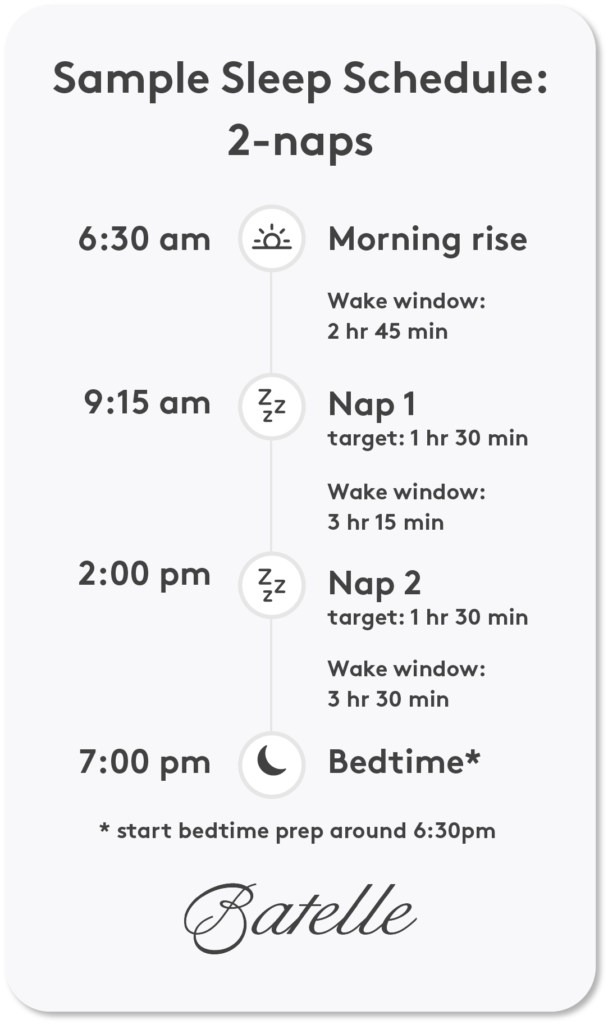
GET STARTED WITH A FREE CUSTOM SCHEDULE AND PLAN OVERVIEW ON OUR MOBILE APP →
TRY BATELLE FOR FREE →

At around 9 months, your baby may have settled into a consistent sleep schedule, with two naps occurring at predictable times during the day. However, it’s important to note that any sleep disruptions that occur during this time are not necessarily due to age, but rather to developmental milestones that your baby is mastering.
This period between 8-10 months is sometimes referred to as the 8-10 month sleep regression due to the many changes and developments that occur during this time. Check out our previous blogs on the 8-month and 9-month sleep regressions to learn more about this.
In this blog, we’ll take a look at your 9-month-old baby’s sleep schedule. We’ll go over the average wake windows, sleep duration, and bedtime to help you create a flexible sleep schedule that works for your family.

When planning naps for your 9-month-old, consider both the total amount of daytime sleep and the duration of individual naps. Limit each nap to no more than 2 hours, and aim for a cumulative daytime sleep total of 2-3 hours. This ensures your baby gets enough rest during the day without affecting their night sleep. For instance, if your baby typically sleeps for 13 hours in total over 24 hours, a balance of 2 hours in naps and 11 hours at night is ideal. Adjusting for 3 hours of daytime sleep would correspondingly reduce night sleep to 10 hours.
Customize your little one’s sleep schedule with Batelle’s Schedule Creator. Input your baby’s usual waking time, bedtime, number of naps, and sleep duration, and our generator will tailor a sleep schedule with appropriate wake windows for your baby’s age. Try it out now and make sleep planning a breeze!
The goal for a 9-month-old baby is to achieve approximately 10-12 hours of nighttime sleep. While many babies start to sleep through the night around 6-9 months, this can vary. Sleep patterns differ among infants, so at 9 months, your baby may still be working on consolidating their sleep periods and sleeping for longer stretches at night. Night waking is still common, and night feeding can also still be common at this age – particularly for breastfed infants.
It is worth noting that the meaning of ‘sleeping through the night’ may vary from family to family. For some, their baby may be considered to be sleeping through the night if there are a few night wakings, as long as these wakings are handled efficiently and do not significantly impact overall sleep. Others may define it as a completely uninterrupted stretch from bedtime until morning.
It’s important to note that the longest uninterrupted stretch of sleep usually happens at the start of the night, while the second half of the night and early morning tend to be more restless. This is because sleep pressure and melatonin are at their highest levels at the beginning of the night, and gradually decrease towards morning.
If you notice that your little one isn’t sleeping for a solid period during the first part of the night, it may be worth checking their sleep schedule to see if they’re going to bed either overtired or not tired enough. It’s also a good idea to review their feeding schedule to make sure they’re getting most of their feeds during daytime hours, as this can help encourage longer stretches of sleep at night.
And remember, it’s always best to consult with your pediatrician before making any significant changes to your little one’s feeding routine, especially if they were born prematurely or are underweight.
As mentioned earlier, the time between 8-10 months is full of developmental milestones. Your little one is acquiring new skills and new mobility, and they may be experiencing separation anxiety. Additionally, teething can also impact sleep.
Sleep regressions can last anywhere between 2 to 6 weeks. The extent and duration of sleep disruption, caused by changes in routine or developmental milestones, are influenced by various factors, including how you respond to your baby during these times. It is usual to support your baby’s sleep during the most intense phases of developmental growth, when they are experiencing teething discomfort, or when they have had a day of short naps and inadequate sleep. However, it is easy to get caught up in an unsustainable routine if your primary method of helping your child fall back asleep involves a lot of interaction from you.
Sleep training can be helpful if you’re feeling overwhelmed or stuck in a pattern that is leaving you exhausted. Families who have consistent bedtime routines, nighttime interactions, and sleep habits may experience shorter and less intense periods of sleep disruption during sleep regressions. Sleep training can help guide you on how to create sustainable and consistent nighttime routines and foster your little one’s ability to self-soothe.
